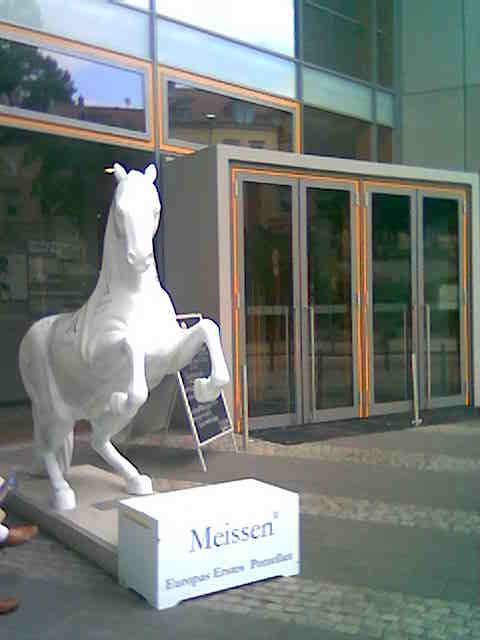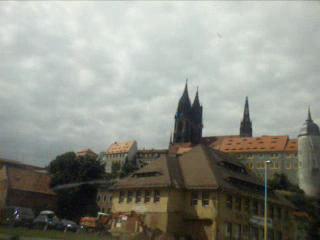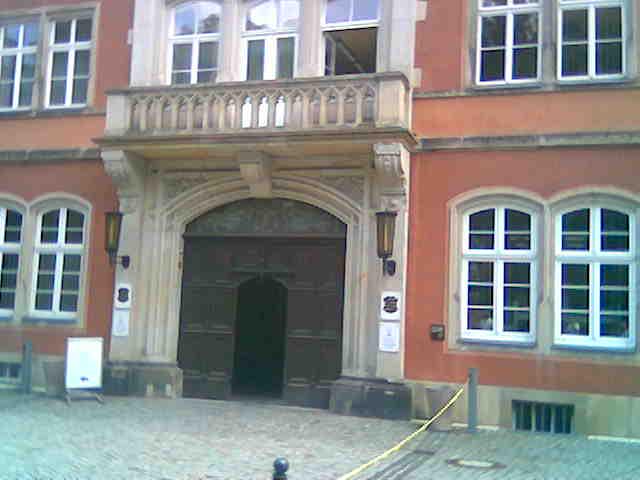 Meissen (German spelling Meißen) is the oldest town in Saxony, Germany. It is very close to Dresden and the adjacent landscapes of the Saxon Switzerland. Meißen was once home to the local bishop and has a huge medieval cathedral and adjoining castle. Meißen was also the residence of the dukes of what would later become Saxony, before they moved to Dresden.
It is also the place where the first European porcelain was invented. The factory is still producing today and you can visit it and get to experience it. Meißen porcelain (German: Meißner Porzellan) enjoys an excellent reputation and is priced accordingly.
Meissen (German spelling Meißen) is the oldest town in Saxony, Germany. It is very close to Dresden and the adjacent landscapes of the Saxon Switzerland. Meißen was once home to the local bishop and has a huge medieval cathedral and adjoining castle. Meißen was also the residence of the dukes of what would later become Saxony, before they moved to Dresden.
It is also the place where the first European porcelain was invented. The factory is still producing today and you can visit it and get to experience it. Meißen porcelain (German: Meißner Porzellan) enjoys an excellent reputation and is priced accordingly.


- The porcelain factory and museum, Talstraße 9, +49 3521 468-0. A museum dedicated to the porcelain that has made the town famous.
- Albrechtsburg. A castle in Meißen.
- Meissen cathedral.
- Besides this, it is also worth to take a look at the town itself and its old beautiful houses.
The porcelain factory and museum, Talstraße 9, +49 3521 468-0. A museum dedicated to the porcelain that has made the town famous.
Albrechtsburg. A castle in Meißen.
Meissen cathedral.
Meißen is a rather quiet town and there isn't all that much you can do that doesn't have to do with either porcelain or the castle and former residence.
- Haus des Sächsischen Weines, Am Markt 5, Meißen, +49 352140 92-47. Daily, 10.00–18.00. Wine tasting and sale.
- Weinhaus Schuh, Zaschendorfer Str. 2, Sörnewitz (between Meißen and Coswig, +49 352384810. Mo–Fr, 10.00–18.00; Sa, 10.00–17.00; Su, 11.00–16.00. A private winehouse of the Schuh family. Wine tasting, sale, excursion to the vineyard, cafe, and a small hotel (guest house).
Haus des Sächsischen Weines, Am Markt 5, Meißen, +49 352140 92-47. Daily, 10.00–18.00. Wine tasting and sale.
Weinhaus Schuh, Zaschendorfer Str. 2, Sörnewitz (between Meißen and Coswig, +49 352384810. Mo–Fr, 10.00–18.00; Sa, 10.00–17.00; Su, 11.00–16.00. A private winehouse of the Schuh family. Wine tasting, sale, excursion to the vineyard, cafe, and a small hotel (guest house).
Perhaps the weirdest local speciality is the "Meißner Fummel" a very brittle piece of dough that tastes of basically nothing and consists mostly of air. It was supposedly invented to be transported along with the famous Meissen china to prove that any breakage was not due to the recklessness of the coach-driver. Some bakeries sell it and you are bound to be told about them in any guided tour of the city. Tasting is often included
- Vincenz Richter Restaurant, An der Frauenkirche 12, 01662 Meissen, +49 3521 453285. Tue to Sun from 1200, Sun til 1800, Mo closed. Traditional wine house and restaurant since the 1870s.
- Gasthaus „Meißner Groschen“, Rosengasse 12 (Altstadt am Tuchmachertor, +49 3521 4764414..
Vincenz Richter Restaurant, An der Frauenkirche 12, 01662 Meissen, +49 3521 453285. Tue to Sun from 1200, Sun til 1800, Mo closed. Traditional wine house and restaurant since the 1870s.
Gasthaus „Meißner Groschen“, Rosengasse 12 (Altstadt am Tuchmachertor, +49 3521 4764414..
Meissen is the easternmost wine area in Germany and on the northeastern edge of winegrowing in Europe. Meissen Wines are mostly white wines and they are, given their location, rather on the dry side, The most common grapes are Riesling, Müller-Thurgau, and Weißburgunder. Red wines are rather uncommon. As the wine area is not too large and hardly able to meet the demand, Meissen wines are rather scarce and therefore pricey.
- Dresden and Saxon Switzerland by S-Bahn (you don't have to change trains in Dresden to go all the way to Bad Schandau)
- The Czech Republic is relatively close by take the S-Bahn to Dresden and than an Eurocity directly to Prague (via Usti nad Labem)
